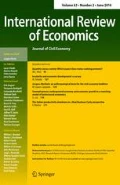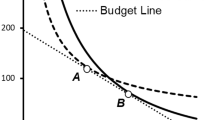Abstract
Many nudges are designed to make people better off, as judged by themselves. This criterion, meant to ensure that nudges will increase people’s welfare, contains some ambiguity. It is useful to distinguish among three categories of cases: (1) those in which choosers have clear antecedent preferences, and nudges help them to satisfy those preferences (often by increasing “navigability”); (2) those in which choosers face a self-control problem, and nudges help them to overcome that problem; and (3) those in which choosers would be content with the outcomes produced by two or more nudges, or in which ex post preferences are endogenous to nudges, so that without additional clarification or work, the “as judged by themselves” criterion does not identify a unique solution for choice architects. Category (1) is self-evidently large. Because many people agree that they suffer self-control problems, category (2) is large as well. Cases that fall in category (3) create special challenges, which may lead us to make direct inquiries into welfare or to explore what informed, active choosers typically select.
Similar content being viewed by others
References
Conly S (2014) Against autonomy. Oxford University Press, Oxford
Cornwell JF, Krantz DH (2014) Public policy for thee, but not for me: varying the grammatical person of public policy justifications influences their support. Judgm Decis Mak 5:433–444
Dolan P (2014) Happiness by design. Penguin, New York
Elster J (1983) Sour grapes. Cambridge University Press, Cambridge
Goldin J (2015) Which way to nudge? Uncovering preferences in the behavioral age. Yale Law J 125:226–271
Goldin J, Lawson N (2016) Defaults, mandates, and taxes: policy design with active and passive decision-makers. Am J Law Econ 18:438–462
Halpern D (2015) Inside the nudge unit: how small changes can make a big difference. W. H. Allen, London
Halpern SD et al (2015) Randomized trial of four financial-incentive programs for smoking cessation. N Eng J Med 372:2108–2211
Infante G, Lecouteux G, Sugden R (2016) Preference purification and the inner rational agent: a critique of the conventional wisdom of behavioural welfare economics. J Econ Methodol 23:1–25
Jung JY, Mellers BA (2016) American attitudes toward nudges. Judgm Decis Mak 11(1):62–74
Lichtenstein S, Slovic P (2006) The construction of preference. Cambridge University Press, Cambridge
Reisch L, Sunstein CR (2016) Do Europeans like nudges? Judgm Decis Mak 11:310–325
Stroud S, Tappolet C (eds) (2003) Weakness of will and practical irrationality. Clarendon Press, Oxford
Sugden R (2016) Do people really want to be nudged towards healthy lifestyles? Int Rev Econ. doi:10.1007/s12232-016-0264-1
Sunstein CR (2014) Why Nudge?. Yale University Press, New Haven
Sunstein CR (2016a) The council of psychological advisers. Ann Rev Psychol 67:713–737
Sunstein CR (2016b) The ethics of influence. Cambridge University Press, Cambridge
Sunstein CR, Reisch LA (2014) Automatically green: behavioral economics and environmental protection. Harvard Environ Law Rev 38:127–158
Sunstein CR, Reich L, Rauber J (2017) Behavioral insights all over the world? Public attitudes toward nudging in a multi-country study. https://papers.ssrn.com/sol3/papers.cfm?abstract_id=2921217
Thaler RH (2015) Misbehaving. Norton, New York
Thaler RH, Sunstein CR (2008) Nudge: improving decisions about health, wealth, and happiness. Yale University Press, New Haven
Tversky A, Thaler RH (1990) Anomalies: preference reversals. J Econ Perspect 4:201–211
Ullmann-Margalit E (2017) Normal rationality. Oxford University Press, Oxford
Wolf F (1990) Parallel universes: the search for other worlds. Simon & Schuster, New York
Acknowledgements
I am grateful to the Program on Behavioral Economics and Public Policy for support and to Jacob Goldiu and Lucia Reisch for valuable comments on a previous draft.
Author information
Authors and Affiliations
Corresponding author
Rights and permissions
About this article
Cite this article
Sunstein, C.R. “Better off, as judged by themselves”: a comment on evaluating nudges. Int Rev Econ 65, 1–8 (2018). https://doi.org/10.1007/s12232-017-0280-9
Received:
Accepted:
Published:
Issue Date:
DOI: https://doi.org/10.1007/s12232-017-0280-9




